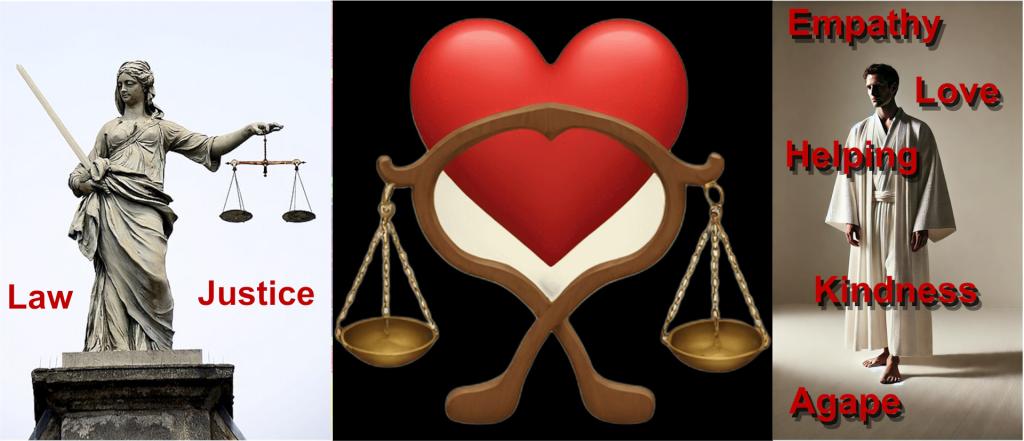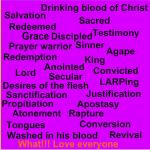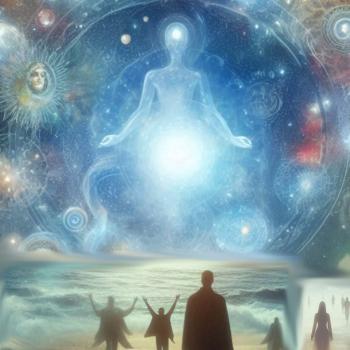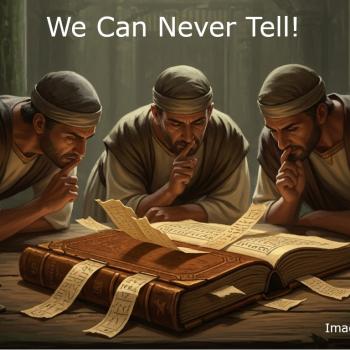Summary
Podcast show links: Substack, YouTube video, Spotify, and Apple podcasts.
Why does love fulfill the law?
The Apostle Paul was sent to non-Jews. He wasn’t to make them Jews or have them adopt Jewish law. He was to help them understand how to live through love.

The Gate of Justice, at the Dublin Castle, sculpted by John van Nost the Younger and erected in 1750. Picture by Osama Shukir Muhammed Amin FRCP(Glasg), CC BY-SA 4.0 via Wikimedia Commons.
Heart and law emoji | AI Emoji Generator. White robe man, representing agape love, by ChatGPT.
Reference verses:
“Do not think that I have come to abolish the Law or the Prophets; I have come not to abolish but to fulfill. – Matthew 5:17
“When Jesus had received the wine, he said, “It is finished.” Then he bowed his head and gave up his spirit.” – John 19:30 (RSV)
For Paul this was a difficult task. A very learned Jew, with zeal in his beliefs, when he became a follower of Jesus, he struggled to the depths of his soul with not forcing Jewish law onto those he helped follow Jesus’ ways. He accomplished the task and left behind for us the difficult theological struggles he conquered.
The Jews, when they became followers of Jesus, were to remain Jews and follow their laws and customs. This was not so for non-Jews. Paul tells us the non-Jew guide is love.
For many Christians who read the Hebrew Bible, and Jesus’ teachings, it’s difficult to remember that the Jewish law was not for non-Jews. It doesn’t help that Jesus spoke primarily to Jews about their law, so Jesus’ sayings are full of Jewish teachings. The Torah, which Jesus fully supported, is the first five books of the Bible. It was their guide for living. So nearly every statement Jesus made targeted Jews. As Jesus said, first to the Jews, then to others.
It seems people want some guidelines to live by. I’ve talked to people who even try to derive rules from what Jesus said. The difficulty with rules is that they change over time, and people find ways to break them so they can do what they want anyway. You can’t break love. If you do something to hurt someone, you break love. Love doesn’t change. God is love.
We’re all human, so we break love. We have empathy and compassion, but it’s necessary for us to learn the consequences of our actions.
Just for fun: A music video. A poem I made for my wife and set to music, in video. Two versions: In Love With the Woman You Are #1, #2. Enjoy!
Is Jewish law okay?
There is nothing wrong with Jewish law. Love is a component in it. It’s just that love is the sustaining way through history, and the way prescribed for non-Jews. To God there is no difference between Jews and non-Jews except covenant expectations. The new covenant brought by Jesus is love. As Paul indicated, living the Jewish life is not easy, and is meant to be an example of devotion to God. Living by love is also difficult.
Because we don’t understand how living by love is possible, we revert to the simplistic: law.
Covered in the Deep Dive:
In the deep dive we’ll explore Jesus’ statements about fulfilling the Law and their implications. First we’ll focus on the meaning of the terms “law” and “fulfill” in biblical contexts. Jesus emphasized that he came to fulfill, not abolish, the Law, meaning he completed and brought it to its intended purpose rather than ending it. On the cross, Jesus declared his mission “finished” (Greek: tetelestai), signifying the completion of his sacrificial role.
Then we’ll focus on the Apostle Paul and his reasoning about love and law.
In the next blog-article, we’ll look at moral development. Is the law really something that is within us? What about compassion? The answer is yes, but with caveats.
Key Themes:
- Understanding the Law:
- In Judaism, the Law (Torah) includes the first five books of the Bible, encompassing moral, ceremonial, and societal instructions.
- To Jews, the Law represented a way of life, not just legal rules.
- Jesus said he fulfills the Law and Prophets, referencing both the Hebrew Bible and his role as the Messiah.
- Jesus fulfilled the Law by embodying its purpose and establishing love as its essence.
- Both Jews and non-Jews have the Law of God within them through the Holy Spirit.
- Jesus’ Fulfillment:
- Jesus “fulfilled” the Law (plērōsai) by completing its requirements, fulfilling prophecies, and demonstrating God’s intentions for human behavior through love. In this he fulfilled the Torah and the prophets.
- His life and teachings introduced a new covenant centered on love, faith, and spiritual guidance.
- Jesus’ words about fulfilling the Law refer to bringing it to completion, not abolishing it.
- Paul’s Perspective:
- Paul distinguished between Jewish and non-Jewish obligations to the Law. Jews were to uphold the Law with love as the core, while non-Jews were guided by faith and love without the burden of Mosaic Law, which includes the 613 laws found in the first five books of the Bible.
- Paul’s writings emphasize love as the ultimate fulfillment of the Law, echoing Jesus’ teaching to love God and neighbor as the greatest commandments.
- Non-Jews are not asked to follow Jewish Law. Relying on following the law defeats Jesus’ purpose. Love is the all-encompassing standard. It isn’t possible to break a relevant law if you’re acting out of love.
In essence, Jesus redefined the Law through love and spiritual fulfillment, offering a universal path to righteousness that transcends legalism while honoring the Law’s original purpose.
End summary
Deep Dive
There are several contextual questions about what Jesus and Paul meant when they said the word Law.
What does the word law mean?
The Law in Judaism means the entirety of the first five books of the Bible. It wasn’t what we think of as laws. Laws to us are rules laid out by the government, religion, or the universe. To the Jews it meant the way to live; instructions set out by God. There were several types of law, such as ceremonial law, laws about fidelity to God, and how to treat your neighbor. There were 613 Jewish laws.
Types of Jewish law. A List of the 613 Mitzvot (Commandments).
Most important in Judaism were how to treat your neighbor. Jews (and Christians) were to take care of offenses right away and make it right. Offenses against God were forgiven each year on the Day of Atonement. Judaism is saturated with the idea of sacrificing, with all kinds of ceremonial offerings. There were many types of sacrifices in Judaism for various purposes.:
For Christians, forgiveness for falling short of expectations comes from asking God directly. No priest or sacrifice required. Although, some denominations do use priests for confessing shortcomings and prescribe a token sacrifice such as saying the Rosary. The human element can be very important to some.
Can we trust the translation?
Looking at words and their meanings raises legitimate questions about the differences between Hebrew or Aramaic, and Greek word meanings, about the accuracy of the original recordings of statements, and about today’s interpretations.
The New Testament was written in Greek. Was this the language of Jesus and the apostles? Some have said that Jesus and his apostles were likely illiterate and spoke only Aramaic. That’s a bold assumption.
They might not have been able to do more than elementary writing. But Greek had been spoken in the land since Alexander the Great conquered the area and forced the Greek language and culture on people, in 300 BC. The Hebrew Bible was soon converted to Greek.
Northern areas, occupied only partially by Jews, spoke Greek. Only a few miles from where the apostles lived was a major trade center, Capernaum, established by the Romans, where many nationalities came to trade. Many languages were spoken, but Greek was likely preferred.
The Roman soldiers in the area, although their heritage was Latin, likely spoke Greek for conversation and trade. It was the common language of the empire. Anyone involved in trade, which would include fishermen and carpenters, likely spoke Greek well enough to get along.
The Apostles James and John were from Capernaum, which was a major trading village in the Gennesaret area of ancient Palestine, located near the Via Maris, a major trade route that connected Damascus in the north with Egypt in the south.
Indications from word usage in the Bible that Jesus spoke Greek:
- The Lesson (sermon or teaching) on the Mount. Jesus’s teaching in Matthew 5–7 was likely given in Greek because the audience came from many different places, including the Decapolis (major trading centers around the Mediterranean or Levant), where Greek was the primary language.
- Conversations with Pilate and a Roman centurion. Jesus spoke with Pilate in Greek, as indicated by the pace of the conversation and the fact that there’s no evidence of an interpreter. Jesus also spoke with a Roman centurion in Matthew 8:5.
- Conversation with the Syrophoenician woman. In Mark 7:25-30, Jesus spoke with a woman from Tyre, where Greek was widely used.
- Jesus and his disciples often alluded to or quoted from the Greek translation of the Hebrew Bible (LXX, translated 285–247 BC).
- Word play in the Beatitudes: The Beatitudes in the Gospels use Greek word play, such as plurals ending in ς (s) and οι (oi).
It’s very likely that there was no mistranslation by people who remembered or wrote down what Jesus said.
So what do the words mean?
The relevant words are “fulfilled” and “law.”
Regarding the word “fulfill,” two words Jesus used were translated that have different meanings, and give us linguistic context on whether something was meant to be final and end, or an ongoing fulfillment.
On the cross, Jesus’ last words were, “it is finished.” He used the word “Tetelestai” (τετέλεσται). This means that something is complete, brought to completion, a goal is reached. This is final.
When Jesus said he fulfilled the law, he used a different word, “plērōsai.” This carries the idea of fullness, bringing something to fulfillment, or making it fruitful, not an ending. For example, fulfillment of prophecies, or the filling of individuals with the Holy Spirit.
When Jesus said that he came to fulfill the law and the prophets, he referred to the entire Hebrew Bible, both the Torah (first five books, AKA the way to live) and the books about prophets. It was all fulfilled. The covenants God made with the Hebrews, Israelites, and Jews, as the people were progressively known through history, were brought to fullness, but not ending.
The Hebrew word for Biblical law is Torah. Torah refers to the first five books of the Hebrew Bible. There is no other translation for Torah. When they translated the word into Greek, the Jews used the word “nomos.” Nomos to the Jews generally meant “the collection of mishpatim, chukkim, and mitzvot representing all of Israel’s covenantal obligations before the LORD.” The word lord usually refers to God.
To the Jews Torah means instruction, not commandment. It can also mean tradition as in the oral law (traditions of the fathers).
Nomos and Torah: Does “law” adequately translate “Torah?” A Jewish perspective.
Love fulfills the law
Jesus brought an entirely new way of thinking. The Spirit of God would be poured out on them, so that they would know the law (way to live). He was an unexpected type of Messiah, not a king or military ruler. Instead, he brought the spiritual kingdom of God. They could enter the spiritual kingdom immediately by following the way God had shown them to live through Jesus’ life. Following Jesus’ way brought transformation.
The law is obedience and conformance. Love brings transformation. Transformation is a much higher goal.
In view of what Jesus brought and stood for, what did Jesus mean by “he fulfilled the law?” Was it that the law would continue? Or that there was something new?
The answer depends on who you are. Jews would continue being Jews and follow the law, but were to emphasize love. Love was most important.
Non-Jews could also enter the Kingdom by following Jesus’ ways, but Jewish law was not the way for them. Neither the Bible nor the Jews extend Jewish law to non-Jews. They weren’t embedded in Judaism. Their way was love.
Jesus created one new commandment
“I give you a new commandment, that you love one another. Just as I have loved you, you also should love one another.” – John 13:34
The law of Christ is generally understood to be what Christ stated were the greatest commandments in Mark 12:28–31. Others consider the law within to be the Noahide law, which is similar but more basic.
“… “Which commandment is the first of all?” Jesus answered, “The first is, ‘Hear, O Israel: the Lord our God, the Lord is one; you shall love the Lord your God with all your heart and with all your soul and with all your mind and with all your strength.’ The second is this, ‘You shall love your neighbor as yourself.’ There is no other commandment greater than these.”” – Mark 12:28–31
In understanding whether Jesus and the apostles are speaking about law, law with love, or love, it’s important to understand who they were talking to, Jews, non-Jews, or both. This makes it very confusing because we don’t have clear pictures of the makeup of those early communities.
The Apostle Paul was sent primarily to non-Jews. He also ministered to Jews. Paul was the only apostle we’re aware of having formal education, which was a school of Judaism. So, he not only knew Judaism well, he would have been adept at navigating Jewish thought with a critical perspective. Obvious in Paul’s letters and writing is that he wrestled with what is asked of Jews and what is asked of non-Jews. He talked with other apostles about his thoughts and came to a consensus opinion.
The best way to understand what is required of non-Jews is through examining Paul’s writings. He wrestles with theology, often speaking in confusing and vague terms, and about his nature that fails the high standard, and about other people with the same affliction. Following are excerpts:
“Then what becomes of boasting? It is excluded. Through what kind of law? That of works? No, rather through the law of faith. For we hold that a person is justified by faith apart from works prescribed by the law. Or is God the God of Jews only? Is he not the God of gentiles also? Yes, of gentiles also, since God is one, and he will justify the circumcised on the ground of faith and the uncircumcised through that same faith. Do we then overthrow the law through this faith? By no means! On the contrary, we uphold the law.” Romans 3: 27-31
“In the same way, my brothers and sisters, you have died to the law through the body of Christ, so that you may belong to another, to him who was raised from the dead in order that we may bear fruit for God. For while we were living in the flesh, our sinful passions, aroused by the law, were at work in our members to bear fruit for death. But now we are discharged from the law, dead to that which held us captive, so that we are enslaved in the newness of the Spirit and not in the oldness of the written code.
“What then are we to say? That the law is sin? By no means! Yet, if it had not been for the law, I would not have known sin. I would not have known what it is to covet if the law had not said, “You shall not covet.” But sin, seizing an opportunity through the commandment, produced in me all kinds of covetousness. For apart from the law sin lies dead. I was once alive apart from the law, but when the commandment came, sin revived and I died, and the very commandment that promised life proved to be death to me. For sin, seizing an opportunity in the commandment, deceived me and through it killed me. So the law is holy, and the commandment is holy and just and good.” – Romans 7: 4-12
“So I find it to be a law that, when I want to do what is good, evil lies close at hand. For I delight in the law of God in my inmost self, but I see in my members another law at war with the law of my mind, making me captive to the law of sin that dwells in my members. Wretched person that I am! Who will rescue me from this body of death? Thanks be to God[b] through Jesus Christ our Lord! – Romans 7: 21-25
So then, with my mind I am enslaved to the law of God, but with my flesh I am enslaved to the law of sin.”
Paul used the word nomos for each word translated as law. But this would be the law of nature regarding sin, and the law of God.
In a final statement in Romans, Paul makes his view clear:
“Owe nothing to anyone except to love one another; for he who loves his neighbor has fulfilled the law. For this, “You shall not commit adultery, You shall not murder, You shall not steal, You shall not covet,” and if there is any other commandment, it is summed up in this saying, “You shall love your neighbor as yourself.” Love does no wrong to a neighbor; therefore love is the fulfillment of the law.” – Romans 13:8-10
Note the emphasis in Paul’s powerful and all encompassing ending statement. “Love does no wrong to a neighbor. Therefore love is the fulfillment of the law.”
Paul’s statement isn’t about breaking Jewish law, or offending God. His emphasis is on how we treat each other. Treating each other well fulfills the law.
Does this statement hold up with Paul’s statements in later writings?
Some believers who were aligned with the Pharisee sect, in Acts 15: 15-29, thought that Paul should be telling the non-Jews to follow the law of Moses. The law of Moses is the first five books of the Bible, which contains the 613 commands.
They formed a council of apostles to consider the matter.
Paul advised them that God makes no distinction between Jew and non-Jew. He gave non-Jews the Holy Spirit just as he did Jews. He was the one appointed to carry Jesus’ message to non-Jews. He cleansed their hearts by faith.
God’s Spirit poured out on all flesh: Joel 2:28, Matthew 3:11, Luke 24:49, John 7:39, John 16:13, Acts 2:17, Romans 8:9, 1 Corinthians 12:7-11, Galatians 3:14, 1 John 2:20
James told them that God had looked favorably on the people who preceded the Jews. And from them he extracted a group of people for God’s name.
The idea that the Jews are the only people who God could see favorably was ridiculous.And they were never asked to follow Jewish law.
Paul then reached a conclusion: “Therefore I have reached the decision that we should not trouble those gentiles [non-Jews] who are turning to God, but we should write to them to abstain only from things polluted by idols and from sexual immorality and from whatever has been strangled and from blood.”
These four things, abstaining from food polluted by idols, sexual immorality, animals strangled, and blood, were all the apostles decided was improper for non-Jews. The words strangled and blood refer to meat not butchered by Jewish ritual standards (kosher).
In a later passage, Paul later even modified the statement about food from idols (Galatians 2: 11-12, Colossians 2: 16-23, and desiring evil and idolatry, in 1 Corinthians 10: 6-7).
In nearly every religion there is one all powerful, creator God to whom we must have allegiance. There may be lesser gods, but we should avoid these and go to the source, which is true. This doesn’t apply to saints, and avatars in Hindu religions, etc.
So we see that Paul’s later statements conformed to his earlier statements about love and law.
Apostle Paul and Jesus concur
The Apostle Paul quoted Jesus, saying, “You shall love your neighbor as yourself.” Love does no wrong to a neighbor; therefore love is the fulfillment of the law.”
” “‘You shall love your neighbor as yourself.’ There is no other commandment greater than these.””
Conclusion after this about church planning:
Church planning season – strong impact course
How can churches minister to new generations if they won’t come to church? The church has been losing people at 1% a year, and now most of new generations won’t come.
I developed and presented a course on understanding and working with new generations. I would like to say I had rave reviews, but on a scale of 1 to 5 it averaged 4.5. Well, some people were raving.
The course helps people understand new generations, their values, and their differences. It helps people understand how to build a bridge to them and minister to them. The old worn-out things we used to do don’t work, and for good reason. This solutions focused course enables people to find new ways, appropriate ways, to minister to these generations in their local circumstances. It’s for church groups and generates deep discussion. </p>
Free video preview of the course
Course on Udemy: Understanding and Working with New Generations
Conclusion
Jesus and the Apostle Paul make a complicated case. Jews remain Jews and follow the 613 laws in the first five books of the Bible, but place more emphasis on love. Non-Jews aren’t burdened by Jewish law.
Both Jews and non-Jews have the law of God within them through the Spirit of God. This is the law of Christ mentioned in Galatians 6:2 and 1 Corinthians 9:21. It most likely refers to the Great Commandment about loving each other, which Paul states in Romans 13:8-10 as fulfilling the law.
Having the law within could also mean the Ten Commandments, the Noahide law, or could be something less specific, such as knowing when we cause harm to others or neglect helping them. This we know by their reactions, empathy, and compassion. It relates to our understanding consequences, so know when we cause harm to others.
Paul tried to help people understand that they were free to assess things and decide for themselves whether or not something was right or wrong. He also understood human nature. Give people a law and they will find ways around it. There can never be enough laws to keep people from hurting each other, and people will find ways to do it anyway.
Let people decide for themselves and they will do stupid stuff. But doing stupid stuff is how we learn about the consequences of our actions, going beyond empathy and compassion. More about this in part 2.
The Ten Commandments are mostly about hurting others. They are like the Noahide or natural law. We have that written in our hearts.
God is love and we are to love others.
In part 2, we’ll look at the idea that we have the law within, which is difficult for many to believe, and about moral development.
Probability Space
What probability spaces can we open in our minds to move away from rules for our behavior and learn to make decisions based on empathy and harm or benefit? Instead of filling people with rules that they’re probably going to find a way to break, can we teach them the consequences of decisions?
(A probability space is where all of the elements necessary for something to happen are present and it’s almost inevitable. All it takes is intention.)
Potential Space
If you think creatively and allow your mind to wander and explore, can we help others understand the impact they have on others so they understand the consequences of their actions?
(A potential space is a virtual space in our minds where entirely new things can take shape.)
More: Is Music A Form Of Prayer?
Would love to hear your thoughts in the comments below. This helps me improve my work.
Please subscribe to my Patheos Newsletter.
Building a Community of Action
New Way Forward community
Can we make positive change in our world and end a lot of suffering?
Helen Keller, who was both blind and deaf, said: “Although the world is full of suffering, it’s also full of the overcoming of it.”
The human spirit yearns for a world without suffering, but it’s through facing challenges that we progress. The world isn’t perfect, but together we can create a future with less hardship. Famine, discrimination, gun violence, and injurious economic and educational disparities are complex problems, yet understanding their root causes empowers us to find solutions.
Launching in first quarter 2025, the New Way Forward community will connect individuals seeking practical solutions and creating lasting change. We’ll focus on understanding problems and their solutions, and how to effectively create change.
Join us in building a brighter tomorrow! New Way Forward on Facebook.
– Dorian
Our answer is God. God’s answer is us. Together we make the world better.
________________________
Restore and recreate. Take time to celebrate life. Laugh, sing, and dance regularly, even every day. Happy. This is why we dance to celebrate life: Reindeer actually running and dancing.
Civic service opportunities
Do Unto Others Kindness Campaign, and civic engagement.
United Methodist Church Volunteer Opportunities.
Join or support Zero Hour and amplify the voices of youth organizing for climate action.
Peoples Hub. Resistance, Resilience, Restoration, Re-imagination. Online Popular Education. For movement workers to learn, connect, collaborate, and strategize – in and across the disability justice and solidarity economy movements.
Stakeholder Capitalism – a video podcast series from the World Economic Forum. Can capitalism be made to work for all of us – and to improve rather than destroy the state of the planet?
General service and aid opportunities (on One Spirit Resources Website). To add your service opportunity to the One Spirit Resources list, contact the author (me) through Facebook Messenger. Note that I only friend people I know.
————————————–
Education Opportunities for new generations
Becoming an Entrepreneur – MITx online
Evaluating Social Programs – MITx online
_______________________
Bible scripture verses are New American Standard Version (NASB), unless noted.
_______________________
Author and books
Appease the Volcano: What does God require from people? The voices of the ancients from many religions echo much of the same things: It starts with law, then mercy and forgiveness, then love. Love is a major emphasis in all major religions and replaces law.
The Prophetic Pattern: Ancient and Modern Prophecy: How to distinguish the intent of various types of prophecies and oracles, both ancient and modern.
Preparing For the Future Of Work and Education: Analysis of the kinds of jobs that AI and Robotics will displace, and the educational requirements for them. AI will replace or augment thirty percent of jobs. This is an in-depth analysis citing many authoritative sources.
Author Website: Dorian Scott Cole













